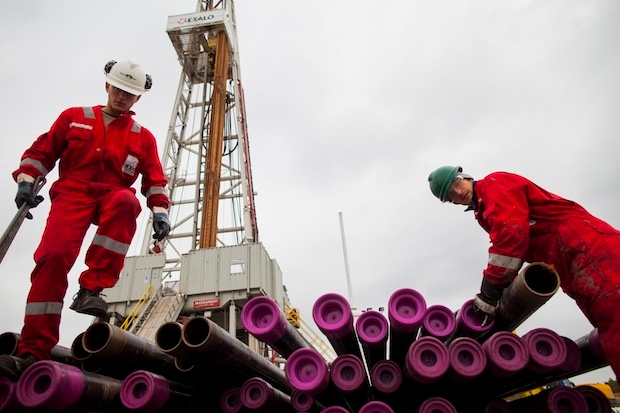It might not be something you want to mention in the Half Moon Inn in Balcombe, or around any of the other communities where people are getting anxious about shale gas explorers ripping up the countryside with their drills and pipelines. But if shale is the tremendous source of wealth that David Cameron insists it can be for this country, how do you go about investing it? After all, if there are fortunes to be made, there is no reason not to claim your share.
There is no longer any question that shale gas is a major industry. In the US, where it is most advanced, it is already worth $76 billion annually, according to its trade association, and by the end of next year that will have grown to $118 billion. A huge amount of wealth has been generated as shale gas fields are opened up, and the infrastructure to support them is built — and energy prices have tumbled. True, we don’t have as much shale gas under the ground as the Americans do. We also don’t have an extensive network of pipelines, or a large stock of land drilling rigs, or wide-open spaces in which to operate them, as the Americans do. But it is still estimated that we have 1.3 trillion cubic feet of the stuff, and even if only 10 per cent of that could be got out of the ground it would be enough to meet the UK’s gas needs for half a century. In the process, someone is going to make a lot of money.
So how do you get your fingers into that honeypot? Not by owning land, unfortunately. Anyone with a few paddocks in the rolling wealds of Kent and East Sussex, or in the Bowland basin of Lancashire, might secretly be hoping that a fracking company will turn up on their doorstep one day waving a cheque for a few million for the rights to start drilling on their land. Unfortunately, that is not going to happen. In the US, landowners get all the mineral rights to anything under their land, but in this country it belongs to the Crown. Buying up land in areas likely to be rich in shale gas is definitely not going to make you a fortune. A few are trying to use the law of trespass to demand compensation — the idea is that drillers will be trespassing on your land — but that is unlikely to ever be worth much.
The explorers are a far more likely bet. There are a number of companies that are already out there trying to get British shale gas into production. By far the best known is Cuadrilla Resources, chaired by the former BP boss Lord Browne. Cuadrilla has heavyweight financial backing, which has allowed it to start developing fields in some of the most promising areas of the UK. It is not a quoted company, though, so you can’t buy shares. There are, however, two quoted developers on the London market, iGas and Egdon Resources. Both have been volatile over the past year, as investor sentiment about the likely size of the opportunity has ebbed and flowed. But they have both secured fields, and could well be among the leaders of the British industry. Indeed, Egdon’s share price more than doubled in January alone, as details emerged of its latest joint ventures.
Which brings us to the French oil giant Total. France’s own government has stopped anyone from trying to exploit the massive shale reserves there, so, like many other enterprising French businesses, Total is doing business on this side of the Channel instead. It already has joint developments in place with both iGas and Egdon, and both those companies are likely to benefit from Total’s expertise.
Small shale gas explorers are always going to be high-risk — just as oil explorers and gold prospectors have offered investors a fortune when they strike it rich, and huge losses on the rather more frequent occasions when they don’t. They face large obstacles, both geological and political. The protestors don’t seem likely to go away, and even if the government is backing fracking, that does not mean that the green lobby won’t be successful in driving away developers — and losing investors a lot of money.
Rather safer are the big companies getting involved in the British industry. Centrica, which owns British Gas, has taken a 25 per cent stake in one of Cuadrilla’s fields. It paid £40 million for the stake, and committed another £60 million to its development, a serious sum of money even for a company of that size. The trouble is, rather like Total, these are huge businesses. One shale gas field is not going to make a vast difference to their profits one way or another. Unlike the small development companies, the shares are not going to make you a fortune. But it might not be too late to profit from America’s recent energy revolution, in the form of US shale gas stocks.
It might be better to invest in some of the industries that will benefit from the development of shale gas rather than in the industry itself. In the US, shale has led to a huge reduction in energy costs, and that has helped the big, heavy industries that consume vast quantities of energy. Dow Chemical, for example, has seen its energy costs drop and its profits rise sharply over the past three years. Over a decade, the same could be true of the (admittedly rather few) major manufacturing companies left in the UK.
Companies that are involved in the transportation of shale oil and gas in the States might also be worth a flutter. Kinder Morgan, for example, is particularly well placed to make money from the shale boom, with 180 storage terminals and 37,000 miles of pipeline. Weir Group, a Scottish-based engineering company which provides pumps for the US shale industry, could be another worthwhile investment.
It might also be worth looking elsewhere. Poland is estimated to have some of the largest shale gas reserves in Europe, and although some of the early test results have been disappointing, and some developers have quit over the country’s tax regime, the first commercial shale gas is expected to be in production next year. With its low-cost — and as we know hard-working — labour force, Poland could become the major manufacturing centre for the whole of Europe if it can add cheap energy to the mix as well. The French are starting to rethink their ban on the industry: if they do overturn it, shale gas could revitalise what right now looks like Europe’s most moribund economy.
Ever since the oil industry started being developed in the late 19th century, energy has been one of the surest ways for businesses and countries to get rich — and it is unlikely that, whatever the obstacles, shale gas will be any different. The trick for investors is to work out which of the potential winners they should start backing.






Comments